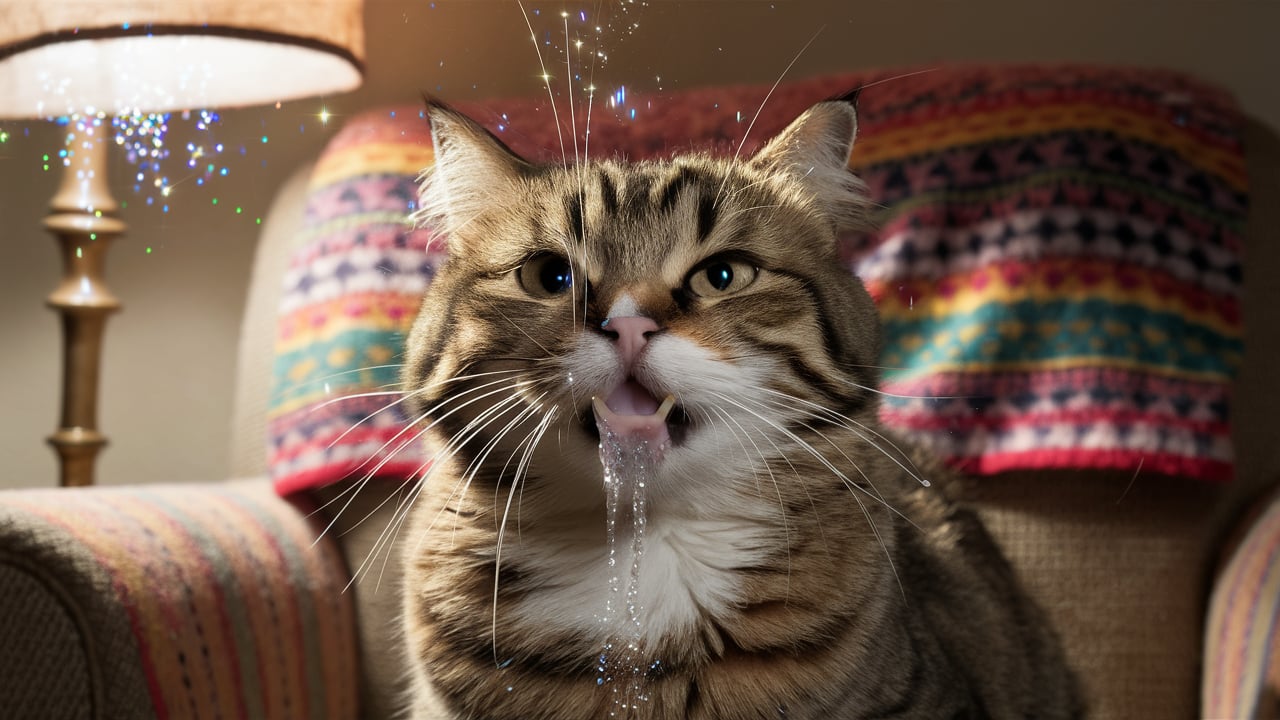Cat salivating too much, or hypersalivation, can be a concerning symptom. While a little drool is normal, excessive drooling can be a sign of underlying health issues. This article, Cat Safety Tips will delve into the potential causes of excessive salivation in cats, helping you understand when it’s time to seek veterinary attention.
What is cat drooling?
Cat drooling, also known as salivation, is a natural and essential process for cats. It’s a vital part of their digestive system, playing a crucial role in breaking down food, keeping their mouths moist, and even regulating their body temperature.
While drooling is a normal part of a cat’s life, excessive drooling (hypersalivation) can be a sign of a health problem. If you notice your cat drooling more than usual, it’s important to consult your veterinarian. They can help determine the underlying cause and recommend the appropriate treatment.
Why is my cat drooling all of a sudden?
It’s concerning to see your cat drooling excessively, especially if it’s a sudden change in behavior. While a little drool is normal, a sudden increase in salivation could indicate a variety of issues. Here are some common reasons why is my cat drooling.
Dental Problems
- Tooth Decay: A toothache can cause discomfort and lead to excessive drooling.
- Gum Disease: Inflamed gums can be painful and trigger increased salivation.
- Foreign Object: If your cat has swallowed something they shouldn’t have, it could be lodged in their mouth or throat, causing irritation and drooling.
Gastrointestinal Issues
- Nausea: If your cat is feeling nauseous, they might drool more as a reflex.
- Indigestion: A stomach upset can also lead to increased salivation.
- Hairballs: Cats often drool more when they are trying to get rid of a hairball.
Stress and Anxiety
- New Environment: Moving to a new home or experiencing a change in routine can cause stress, which can trigger excessive drooling.
- Fear or Anxiety: If your cat is scared or anxious, they might drool more as a stress response.
Medical Conditions
- Kidney Disease: Kidney problems can cause an imbalance in electrolytes, leading to increased salivation.
- Liver Disease: Liver issues can also lead to excessive drooling.
- Rabies: While rare, rabies is a serious condition that can cause excessive drooling.

Medications
- Side Effects: Certain medications can have side effects that include excessive drooling.
Treatment of cat salivating too much
Treating a cat’s excessive salivation (hypersalivation) depends entirely on the underlying cause. Here’s a breakdown of common treatment approaches:
Addressing Dental Issues
- Dental Cleaning: A professional dental cleaning can remove plaque, tartar, and infected teeth, addressing the source of pain and irritation.
- Extractions: If teeth are severely damaged or infected, they may need to be extracted.
- Antibiotics: Antibiotics may be prescribed to treat infections in the mouth or gums.
- Pain Relief: Pain relievers can help manage discomfort and reduce drooling.
Managing Gastrointestinal Issues
- Diet Changes: Switching to a bland diet or a food specifically designed for sensitive stomachs can help reduce nausea and indigestion.
- Anti-Emetics: Medications to prevent vomiting can help reduce nausea and drooling.
- Hairball Remedies: Hairball remedies can help reduce hair accumulation in the stomach and prevent hairballs.
Addressing Stress and Anxiety
- Environmental Enrichment: Providing your cat with plenty of toys, scratching posts, and hiding places can help reduce stress and anxiety.
- Feliway Diffuser: A Feliway diffuser releases pheromones that can help calm cats and reduce stress.
- Behavioral Modification: Working with a veterinarian or certified animal behaviorist can help you identify and address specific stressors and teach your cat coping mechanisms.
Treating Medical Conditions
- Veterinary Diagnosis: Your vet will need to diagnose the underlying medical condition.
- Treatment: Treatment will depend on the specific condition, but may involve medication, dietary changes, or surgery.
Managing Medication Side Effects
- Veterinary Consultation: If you suspect your cat’s drooling is due to medication side effects, consult your vet. They may be able to adjust the dosage or switch to a different medication.
When to seek veterinary attention?
Here are some situations where you should definitely seek veterinary attention for your cat’s excessive drooling:
Persistent Drooling
If your cat’s drooling doesn’t improve or even worsens despite trying home remedies, it’s time to see a vet. They can help determine the underlying cause and recommend appropriate treatment.
Drooling Accompanied by Other Symptoms
If your cat is drooling excessively along with other symptoms like:
- Vomiting: This could indicate a gastrointestinal issue, a foreign object, or even a more serious condition.
- Lethargy: This could be a sign of a systemic illness or infection.
- Loss of Appetite: This could indicate pain, nausea, or a lack of interest in food due to a medical condition.
- Weight Loss: This could be a sign of a serious underlying issue.
- Difficulty Breathing: This could indicate a respiratory problem or a foreign object obstruction.
- Change in Behavior: If your cat is acting unusually withdrawn, anxious, or aggressive, it could be a sign of pain or discomfort.
Sudden Onset of Drooling
If your cat starts drooling excessively suddenly, it’s important to seek veterinary attention right away. This could indicate a serious medical condition that requires immediate treatment.
Drooling in Kittens
If a kitten is drooling excessively, it’s important to seek veterinary attention promptly. Young kittens are more susceptible to certain health issues, and excessive drooling could be a sign of a serious problem.
Drooling with Blood
If your cat is drooling blood, it’s a medical emergency and requires immediate veterinary attention.
In conclusion
Seeing your cat salivating too much, or cat drooling a lot, can be concerning. Remember, if your cat is drooling excessively, it’s crucial to consult your veterinarian for a proper diagnosis and treatment plan. They can help determine the cause and ensure your feline friend gets back to their healthy, drool-free self.

Related Post
Do Cats Know Their Owners? Do Cats Remember People?
When To Put A Cat To Sleep With Hyperthyroidism?